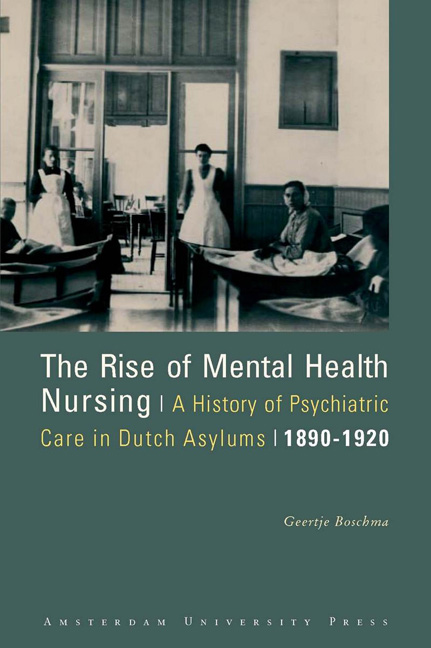Book contents
- Frontmatter
- Contents
- Acknowledgments
- Introduction
- Chapter I Asylum Reform Ideals: Personnel Matters
- Chapter II The Ideal of a Mental Hospital
- Chapter III Female Compassion: Mental Nurse Training Gendered Female
- Chapter IV The Burdensome Task of Nurses
- Chapter V Negotiating Class and Culture
- Chapter VI The Marginalization of Male Nurses
- Chapter VII Controversy and Conflict over the Social Position of Nurses
- Conclusion: The Politics of Mental Health Nursing
- Appendix
- Notes
- List of Illustrations
- List of Abbreviations
- List of Archives
- Bibliography
- Index
Chapter III - Female Compassion: Mental Nurse Training Gendered Female
Published online by Cambridge University Press: 28 January 2021
- Frontmatter
- Contents
- Acknowledgments
- Introduction
- Chapter I Asylum Reform Ideals: Personnel Matters
- Chapter II The Ideal of a Mental Hospital
- Chapter III Female Compassion: Mental Nurse Training Gendered Female
- Chapter IV The Burdensome Task of Nurses
- Chapter V Negotiating Class and Culture
- Chapter VI The Marginalization of Male Nurses
- Chapter VII Controversy and Conflict over the Social Position of Nurses
- Conclusion: The Politics of Mental Health Nursing
- Appendix
- Notes
- List of Illustrations
- List of Abbreviations
- List of Archives
- Bibliography
- Index
Summary
The innovative idea to attract nurses, preferably middle-class women experienced in the care of the sick, to the asylums built on a new gendered image of nursing that had evolved during the nineteenth century. From the beginning of that century nursing gradually became acceptable work for middle-class women. However, psychiatrists chose to institute the new training concept within the asylum structure as a system of hospital-based mental nurse training similar to the nurse training system within general hospitals. This differed drastically to the way nursing had originally evolved as a field of charitable work early in the nineteenth century. At that time, nursing had not yet been linked to the modern hospital as a system of training, nor with the concept of an independent paid professional occupation for middle-class women. The modern hospital did not yet exist at that time and only emerged during the late nineteenth century. Furthermore, a paid career for middleclass women was hardly conceivable or acceptable at the beginning of the nineteenth century; this only became possible during the latter part of the century. Asylum work was not yet considered to be women's work, since male and female patients were cared for by attendants of their own sex. When, psychiatrists incorporated the “nursing idea” into their professional aspirations during the 1890s as a means to create the mental hospital, nursing had already undergone a profound change.
Religious Roots
The socially respected image of nursing – a seemingly natural blending of a refined morality, female compassion, and professional skill – that was so attractive to nineteenth-century doctors was carefully constructed within the context of religious communities of men and women actively involved in charitable work since the seventeenth century. Roman Catholic orders that undertook charitable work re-emerged in seventeenth-century France during the Counter Reformation. Prime examples were the influential male order of the Congregation of Lazarists and the female congregation of the Sisters of Mercy (or Daughters of Charity), founded by Vincent de Paul in 1625 and 1633, respectively, and which spread throughout Europe far into the nine-teenth century. Because public life for women was far more restricted, and at that time orders of nuns had to be formally cloistered, creating congregations for women that were actively involved in charitable work was far more difficult than creating such orders for men.
- Type
- Chapter
- Information
- The Rise of Mental Health NursingA History of Psychiatric Care in Dutch Asylums, 1890–1920, pp. 81 - 112Publisher: Amsterdam University PressPrint publication year: 2003



